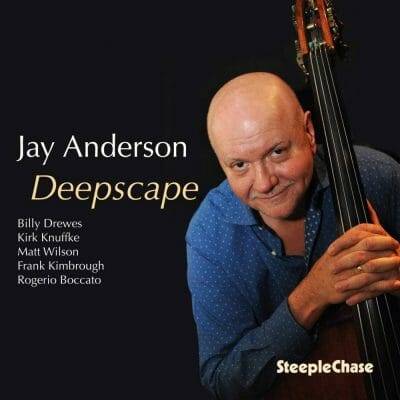Jay Anderson Deepscape
Jay Anderson
Deepscape
Steeple Chase
Bassist and composer Jay Anderson has appeared on over 400 recordings including nearly 100 for this Steeple Chase label. This, at long last, marks his return as a leader. His others as leader were from the early 90s.We don’t have nearly enough space to document all the artists that Anderson has played with but from his start in the Woody Herman Orchestra he has played with Randy Brecker, John Scofield, John Abercrombie, and countless other jazz greats as well as such notable artists as David Bowie, Frank Zappa, and even Celine Dion. Trust me, the list could go on for paragraphs.
On Deepscape, Anderson plays in chordless quarters and quintets, and in a bass-harmonium duet with two of his own pieces surrounded by those of Keith Jarrett, Billy Joel, Gil Evans and Morton Feldman. This approach, represented by similar but slightly different instrumentation used by Ornette Coleman, and later, Old and New Dreams, certainly evokes the wonderful music that artists such as Dewey Redman, Don Cherry, Charlie Haden, Ed Blackwell and Paul Motian made. In many cases, it’s a similar sound. Five of these selections have the bassist leading a chordless quartet/quintet that features Billy Drewes on reeds, cornetist Kirk Knuffke, drummer Matt Wilson, percussionist Rogerio Baccato (on four songs of the eleven) and harmonium player Frank Kimbrough (three songs). Two of the tunes, “Shades of Jazz” and “Southern Smiles,” were recorded by Keith Jarrett’s legendary American Quartet of the ‘70s, a group that included Redman, Haden and Motian, the first two of whom prime members also in the later ‘70s ensemble Old and New Dreams. The first Jarret tune features fine interplay between Drewes’ alto and Knuffke’s cornet as does the more melodic “Southern Smiles,” both in chordless format.
The opening title track is an Anderson composition where he has four layers of bass over a drone. The drone was recorded first with the melody following and then two additional tracks of bass for a meditative vibe, one that stands distinctly apart from most the album. Sandwiched in between the two Jarret pieces is Morton Feldman’s “Rothko Chapel,” another languid track that pays tribute to painter Mark Rothko. “So It Goes” is the Billy Joel tune where Anderson plays solo on bass.
“Time of the Barracudas” is the Gil Evans piece, introduced to Anderson when working with Ryan Truesdell’s Gil Evans Project. For historical reference it first appeared on The Individualism of Gil Evans (1964), Wayne Shorter’s Et Cetera (1980 re-issue) and was also recorded by Miles Davis in 1963 but only finally released as a bonus track to Quiet Nights in 1997. Anderson says the tune was originally done in 3 but rendered here in 12/8. We hear terrific drumming and percussion with Drewes on soprano. Knuffke’s the featured soloist on “Sweet and Lovely,” a tune not written by but associated with Thelonious Monk.
Anderson reveals an insight into one aspect of his composition style by relating this about “Momentum” – “I first came up with a 12 tone row. Then I built upon it exponentially…1st note/1st $ second notes, 1st, 2nd, &3rd notes, etc. …until all 12 notes had been used for a total of 78 notes. I then assigned rhythms to that 78 note melody. Finally a bass part was added for counterpoint and to imply harmony.” Drewes alternates between soprano and bass clarinet here with impeccable tone on each.
“Witchi-Tai-To,” a popular late ‘60s piece was written by Native American saxophonist Jim Pepper, and it has 6 bar chord sequences working with 4 bar melodic phrases. “The Mighty Sword” owes to Branford Marsalis and is yet another in the chordless format. The album concludes with a lovely version of the oft-covered “Tennessee Waltz,” with only Kimbrough on harmonium and Anderson carrying the melody on bass.
This is free bop, free jazz if you will executed with finesse, flair, and imagination. It makes for repeat listens and on one of those, focus just on Anderson’s bass playing. You’ll see why he’s long been regarded as one of the best.
- Jim Hynes
Discover more from Making A Scene!
Subscribe to get the latest posts sent to your email.
















































